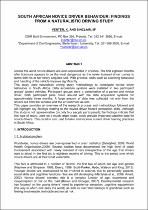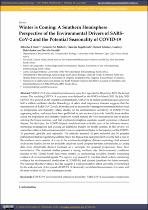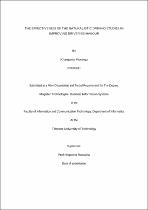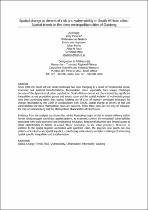 ResearchSpace
ResearchSpace
South African novice driver behaviour: findings from a naturalistic driving study
JavaScript is disabled for your browser. Some features of this site may not work without it.
- ResearchSpace
- →
- Research Publications/Outputs
- →
- Conference Publications
- →
- View Item
| dc.contributor.author |
Venter, Karien

|
|
| dc.contributor.author |
Sinclair, M

|
|
| dc.date.accessioned | 2014-10-27T07:48:55Z | |
| dc.date.available | 2014-10-27T07:48:55Z | |
| dc.date.issued | 2014-07 | |
| dc.identifier.citation | Venter, K and Sinclair, M. 2014. South African novice driver behaviour: findings from a naturalistic driving study. In: South African Transport Conference, CSIR ICC, 7 July 2014 | en_US |
| dc.identifier.uri | http://hdl.handle.net/10204/7743 | |
| dc.description | South African Transport Conference, CSIR ICC, 7 July 2014. Published in Southern African Transport Conference. | en_US |
| dc.description.abstract | Across the world novice drivers are over-represented in crashes. The first eighteen months after licensure appears to be the most dangerous as the newly licensed driver comes to terms with his or her newly acquired skill. With practice, skills such as scanning behaviour and handling of the vehicle improve significantly. This study used naturalistic driving study methodology to investigate novice driver behaviour in South Africa. Data acquisition systems were installed in two participant groups’ (pairs) vehicles. Participant groups were a combination of a parent and novice driver. Both participant pairs drove around with the data acquisition systems for approximately three months. A large amount of data was collected not only from the drivers but from the vehicles and the environment as well. This paper provides an overview of the research process and methodology followed and will highlight key findings relating to the novice driver hazard perception skills. Although this study is not representative (as only four people participated), the findings indicate that this type of study, used on a much larger scale, could provide important baseline data for novice drivers. This could in turn used to tailor and improve current driver training practices in South Africa. | en_US |
| dc.language.iso | en | en_US |
| dc.publisher | Southern African Transport Conference | en_US |
| dc.relation.ispartofseries | Workflow;13567 | |
| dc.subject | Novice drivers | en_US |
| dc.subject | Vehicle handling | en_US |
| dc.subject | Novice driver hazard perception skills | en_US |
| dc.subject | Novice driver hazard perception skills | en_US |
| dc.subject | South African driver training practices | en_US |
| dc.title | South African novice driver behaviour: findings from a naturalistic driving study | en_US |
| dc.type | Conference Presentation | en_US |
| dc.identifier.apacitation | Venter, K., & Sinclair, M. (2014). South African novice driver behaviour: findings from a naturalistic driving study. Southern African Transport Conference. http://hdl.handle.net/10204/7743 | en_ZA |
| dc.identifier.chicagocitation | Venter, Karien, and M Sinclair. "South African novice driver behaviour: findings from a naturalistic driving study." (2014): http://hdl.handle.net/10204/7743 | en_ZA |
| dc.identifier.vancouvercitation | Venter K, Sinclair M, South African novice driver behaviour: findings from a naturalistic driving study; Southern African Transport Conference; 2014. http://hdl.handle.net/10204/7743 . | en_ZA |
| dc.identifier.ris | TY - Conference Presentation AU - Venter, Karien AU - Sinclair, M AB - Across the world novice drivers are over-represented in crashes. The first eighteen months after licensure appears to be the most dangerous as the newly licensed driver comes to terms with his or her newly acquired skill. With practice, skills such as scanning behaviour and handling of the vehicle improve significantly. This study used naturalistic driving study methodology to investigate novice driver behaviour in South Africa. Data acquisition systems were installed in two participant groups’ (pairs) vehicles. Participant groups were a combination of a parent and novice driver. Both participant pairs drove around with the data acquisition systems for approximately three months. A large amount of data was collected not only from the drivers but from the vehicles and the environment as well. This paper provides an overview of the research process and methodology followed and will highlight key findings relating to the novice driver hazard perception skills. Although this study is not representative (as only four people participated), the findings indicate that this type of study, used on a much larger scale, could provide important baseline data for novice drivers. This could in turn used to tailor and improve current driver training practices in South Africa. DA - 2014-07 DB - ResearchSpace DP - CSIR KW - Novice drivers KW - Vehicle handling KW - Novice driver hazard perception skills KW - Novice driver hazard perception skills KW - South African driver training practices LK - https://researchspace.csir.co.za PY - 2014 T1 - South African novice driver behaviour: findings from a naturalistic driving study TI - South African novice driver behaviour: findings from a naturalistic driving study UR - http://hdl.handle.net/10204/7743 ER - | en_ZA |








